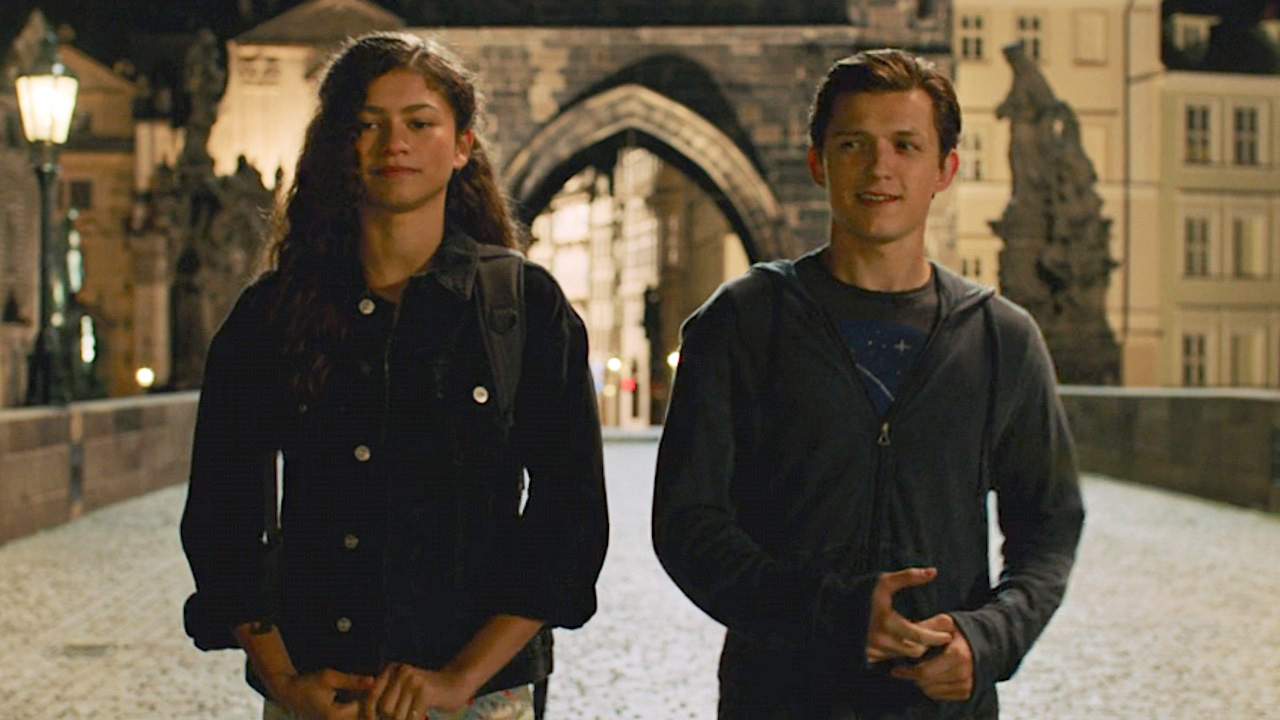Ian McKellen Explores The Lighter Side Of Gandalf On The Set Of The Hobbit
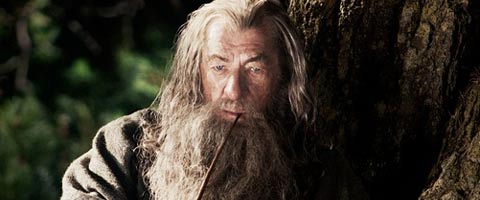
It’s hard to even fathom the idea of Peter Jackson making The Hobbit without Ian McKellen. Beyond the fact that Gandalf plays an incredibly important role in J.R.R. Tolkien’s first novel, McKellen’s performance in the The Lord of the Rings trilogy was nothing short of iconic and he was a major part of what made the movies so iconic. Thankfully that’s not a world that we have to live in.
As I first revealed yesterday, earlier this year I had the mind-blowing opportunity to visit the set of Peter Jackson’s The Hobbit with a group of fellow journalists, and during our first day on set Gandalf himself was gracious enough to spend a few minutes with us to talk about his return to Middle Earth. Check out the conversation below in which the legendary actor talks about the difficulty he had during the start of production, playing with the wizard’s more mischievous side, the need to expand beyond the pages of Tolkien’s novel, as his preference of playing Gandalf The Grey over Gandalf The White.
Could you describe what it was like the first day you got back on set and realized you're back, the universe is going to continue with The Hobbit?
Well, it wasn't quite like that. I came back and I was immediately-- After we had rehearsed the scene I was doing with thirteen dwarves and a Hobbit, because I, a wizard is taller than them, I had to then move out away from them, into my own green screen set, so that my figure could be transposed onto their picture for it to be off by two enslaved cameras working in exactly the same way, at the same point. So the thirteen dwarves are over there in their set, and I'm over in my set, which is a little green screen cutout to make me look tall. With nobody else, because my camera's enslaved to the other one, there isn't an operator. I can't see the people I'm talking to, so they're represented by pictures on top of poles, which light up when they're talking, and I hear them through a sound piece in my ear. I didn't feel like being back, I wanted to go away. I was very, very unhappy, miserable. But fortunately, we haven't had to do-- I think because my reaction was so strong to it, it was very difficult and bewildering, Peter has managed to cut down the number of times we've done that since.
But in the more general sense, it was the sort of feeling we had by the time we were making The Return of The King, that there had already been two films gone out, which had been much enjoyed. So we felt, which you don't often feel when you're doing a job, this is a job that the audience want me to do. But most of the time when you do a job, a play or a film, you're wondering, "Will there be an audience?" We know with The Hobbit, there's going to be an audience. Millions of people are going to want to see it. So we fear we're not on our own. The audience's expectations are ever-present. So it's a more comfortable job than most. There's not that worry at the back, "Are we all wasting our time?" Which you can feel even when you're doing King Lear. So the difference, I suppose, the main difference between the two films, was the personnel. Everybody beyond the camera was familiar, from the director through to Emma who does my costume and Rick who does my make-up. It was back with old friends. But most of the cast, we hadn't met before here, although I knew some of them from England. And they turned out to be a very friendly bunch.
So talk a bit about the character in this film. In the book, it's never really clear why Gandalf is helping the dwarves get the gold. It's never clear why he picks Bilbo as the burglar. I'm curious if those are questions that you as an actor, answer for yourself, even if they're not going to be explicitly said.
No, I think that's a very good point. Once the decision was made to make two films [Note: the set visit was done before it was announced there would be three Hobbit movies], I don't know how that arose, there was room within the confines of a thin book, as opposed to the three Lord of The Rings, to answer that question, which does occur to you, certainly, if you're playing the part and if you're writing the script. And so when Gandalf leaves the dwarves to get on with their job, you get to discover why he is supporting them. And that involves an overview of Middle Earth, which Wizards and High Elves get involved with. So I think that will lead on very well, out of the story of Lord of The Rings, because when it's quite clear that Middle Earth is at stake-- The Hobbit is an adventure story for kids, and told in the first person by someone who might read it to you before you go to bed. Tolkien's in the story, "I, I, I"... Lord of The Rings is about the end of the world. So the tone is clearly very, very different, and that will be reflected. It's reflected in the script, it's reflected in the casting, and it will be reflected, presumably, in the finished film. But alongside that, there's that lighter feel, or a more adventure-story feel. There will be the politics of Middle Earth going on in the background as a support.
Your Daily Blend of Entertainment News
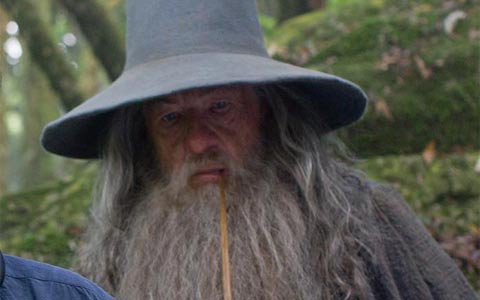
This shoot's been going on since July. I bet you've had breaks, of course. Have you been on every single part of the shoot, or have you been able to do other productions in between?
Like a number of the cast, I've been able to go away, because many of these hiatuses we've had in between-- We've done three blocks, so in between block one and two, I was able to go back to England and do a play, which takes some time. You rehearse, and then you have to play it. So since I'd been back this time, in late February, I haven't had much to do on the sets. That's why I've had time to organize a one-man show, which I'm currently taking around New Zealand on the weekends, to keep me feeling active.
When you were talking about acting opposite the tennis ball, while they're on another screen, doing one-man shows must be kind of similar to that, where you're like, "I'll just have to create the whole world in my head", and just go for it.
Yes. When people in the past have asked me about green screen, I said, "Well, it's only scenery", and when you're on stage, you're not really in a castle, you're not really out of doors, you're not really where you say you are. You just say you are, and there you are, and that's the imagination that happens in the theater. That imagination is translated in film by the film magicians and all the technology. So it doesn't worry an actor that when he's meant to be in the middle of nowhere, he's actually in the middle of a studio. You use your imagination. What's complicated is when you're doing that, but all the rest of the cast are not having to do that, because they're in a real place and looking at each other and not having to pretend. Does that answer the question?
Gandalf comes out much more as a mischievous trickster character in The Hobbit. Do you feel like you were playing it a lot more light in The Hobbit, or because Gandalf is aware of larger things going on in Middle Earth, are you still...
Well, that is a little bit of a dilemma. A bit of both, it depends on what the situation is. The overall view is, "I better keep an eye on these dwarves." Particularly Thorin, who is a bit out of control, and not easily managed. So that's clearly an ongoing relationship. Will Thorin do it Gandalf's way, or will Gandalf have-- Gandalf loses his temper with him at one point. And then at other times, it is light-hearted, yes.
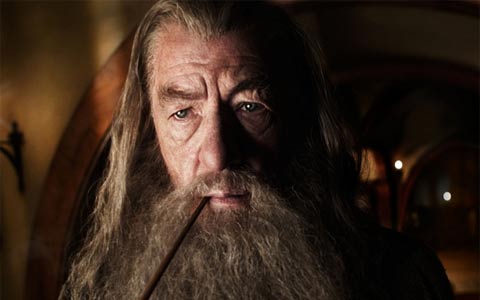
Are we going to see more of a relationship between Gandalf and Thorin in the movie than we see in the book?
I couldn't tell you that, because once there is a script, although it is very helpful to relate back to the book, I don't start comparing the two. And I couldn't make that judgment, really, I don't think. But it's certainly a constant of the story, and each time he and Thorin talk, it's a development of that relationship. But he's got an ongoing one with Bilbo, of course, but that too has its ups and downs. But perhaps that's a little more light-hearted, yeah. Well, Gandalf loves Hobbits. Peter did say to me very early on, there was a rambunctious scene in Bag End, and all the dwarves were eating and drinking too much. He thought it would be fun if Gandalf were a bit tipsy. And I was appalled at that and said, "No, Gandalf doesn't get drunk." But now, after a year of it, I see what Peter was after. I think he wants a lightness, and he's cast some really expert comedians, whose eye will be looking out for what's amusing. And I think Gandalf is a little bit a part of that, but I think the pressure's taken off me once you've got Billy Connolly and Barry Humphries and Stephen Fry, and indeed Martin Freeman, who's an expert comic actor. Let them get on with it I think, really.
Do you know off the top of your head if there are any scenes that Gandalf was in in the books that's not in the movie? That they've taken him out of a scene?
Yes, there are scenes which are not in the book, but that doesn't say they're not in Tolkien somewhere, or in the back of Tolkien's mind. And Philippa [Boyens], who I talked most to about the script, often refers to details in the book that I had overlooked, or implications that she's developed. But you've only got to look at the width of The Lord of The Rings. Things had to be cut to get it down to the three films. The Hobbit is that-- things have got to be expanded. You could, I suppose, have made just one film of the story of The Hobbit. I had an idea way back, that-- I still think it would have been a good idea to not make a film of The Hobbit, but to make a TV series of The Hobbit, and do every episode. Do everything that's in the book in full detail, and just tell the story. It might take thirteen-hour episodes, I don't know. I thought that would have been another way of doing it. But I'm not a producer and I'm not a script writer.
One of the great things about Gandalf's character is there are moments where he's almost winking and he's very friendly, but then he can get very cross very quickly. And obviously, there's plot points where you have to hit those beats. But in between, you can sort of fall between. Is that something that comes to you naturally, or do you map that out in your performance?
I don't really know, but I suspect the base that I'm working from is not particularly one of inquiry, but of memory of what I did last time. It is the same Gandalf. However, there were three films, and in two of them, I was Gandalf the White. And I don't make much connection between White and Grey, and I've never really liked the White. I never said I didn't like playing him, but I didn't warm to him. He's a man with a mission, and he's a commander, and he's a man working right at the end of his tether. Gandalf the Grey, I think Peter agrees, is a much more congenial person, and humane, and full of all sorts of life. And particularly when he's with the Hobbits. There's not a lot of Hobbits in this story, there's one, really. So whenever I'm with him, I think that brings out the side of Gandalf that you're talking about. I don't think he warms to the dwarves as much.
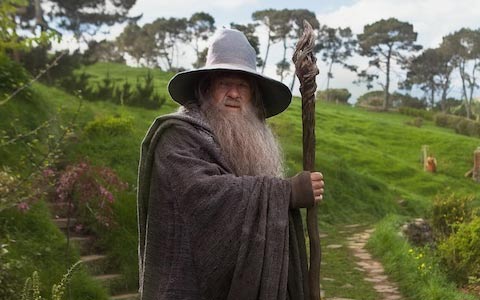
Did you look again at The Fellowship, in particular to look at how you played the Grey, and to refresh your memory?
Oh, I'm not that sort of professional. No, I thought of doing that. It is so painful watching yourself act, particularly because you can't do anything about it, it's all done and dusted. But I had two young friends aged six-- Or was she five? Just on the cusp. And her sister, ten. And they were visiting me, and their parents allowed them for the first time to look at Lord of The Rings, which they thought, perhaps, was a bit too grown up in some senses. So over their shoulders, I watched whilst they were looking at the films for the first time. They watched them all three times in two days. And I saw first-hand, the effect these films have on kids. I know children-- I remember myself, I liked to hear the same story over and over again, but three screening of The Lord of The Rings in two days? But over their shoulders, I thought, "Ooh, I'm not-- I wonder if I am repeating it." I think I'm a bit gruffer than I used to be, and I'm certainly older. Although of course Gandalf ought to be a little bit younger, 'cause these events are happening sixty years before. But when you're sixty-seven thousand years old, I guess it doesn't make much difference. I'm comforting myself. And I obviously look very much the same, because my own features are framed by a wig and a familiar hat, and a mustache and beard, so there's not a lot of me there. In fact, my face has shrunk in the meantime, but it won't be particularly noticeable because it's covered up with hair. So I hope I'm not alarmed if I ever do sit through the five movies.
It seems like there will be a very different dynamic or energy between Gandalf and this particular group that he's with, because in Fellowship they're all basically kids that he's going on this adventure with. In this case, they're all really adults. So can you talk a little bit about finding that group dynamic, that energy there?
Well, the relationships that Gandalf has that develop, are with Bilbo and with Thorin. He talks to the other dwarves, but not with the same sort of depth. So I tend to see them as a group, rather than as-- I know who they are as individuals, but I don't have long-developing relationships with individual dwarves apart from Thorin. And that's as it is in the book. I think the script has made Gandalf a bit less bossy than he is in the novel. But he supports them on their quest, which they call it, and their desire to reclaim their land and property, with a different sort of enthusiasm than he would send the Fellowship off to retrieve the Ring. Which is why it's helpful to me that we should know what's going on elsewhere in Middle Earth, which dwarves tramping around the place, attracting the attention of old enemies and new, threatens to unbalance the ever-present sleeping dragon, the wisdom of waking him, now he's fully grown. If they're going to go off and do that, Gandalf thinks, "I better be there." And he's right.
Were able to work with Christopher Lee in London?
No. I wasn't. Because the time they were shooting him in London, I was doing my play outside London. On the actual days they were shooting, I couldn't-- I would love to have gone and seen Ian Holm at the same time. However, I've seen that scene cut together, in which Gandalf and Saruman appear. It's where they're in the same room, and it's peculiar. I've seen a lot of the film now, a lot of Part One, and it's looking magnificent. But again, I haven't seen it at 48 frames, and I look forward to that.
A lot of actors prefer the Clint Eastwood method of two takes, and some actors like the David Fincher method of fifty takes. I'm just curious what you enjoy doing.
I like to know what's going on. So if for some reason, the director isn't happy with what he's got, he's only got to say why. "Well, it's a tricky camera shot, Ian. It's not you, you're fine." Some directors don't tell you that it's not your fault, so you get increasingly depressed that you're not delivering what's required, and then you discover it's not you at all, it's something in the background that's out of focus. I think if I were asked to do as many as fifty takes, I would assume the director had no idea what he wanted, and was just hoping, eventually, to see it. And you would be surprised how many directors don't know what they want. They might not know what they want until they see it, they might know what they want but no idea how to get it out of the actor, then you've both got a problem. Or they might not be able to explain what they want, or they might want it exactly as they would have imagined it, and are pushing and pushing the actor until they suddenly do it.
And there are directors, and I think this is true of all directors, it would be true if I was a director-- If the actor didn't want to do what I was suggesting, I would let him do it his way, and then I would say to him, "Just give me one where you do what the director wants", and that, of course, is the take that's used. So there can be a bit of politicking going on, but if you trust a director totally, as I do Peter-- Peter's never shown any character, any actor, to disadvantage. He's terribly protective of-- "They must be seen at their very best." And knowing that, and believing that, and having seen it in his work, if he wants me to do twenty-seven takes, I'll do them. But I would of course, much rather feel, after two-three-four-five, whenever things settle down, the cameras know what they're doing, the lighting is to everyone's satisfaction, I would like to feel that we could get it in three or four takes. And not just it, get a variety. And you'll see in the ADR that we're doing at the moment, adding the voice, when necessary, to the picture, that Peter seems to be a director who likes to give himself a choice. He's got a suspicion of the take that he wants to use, but he does have a-- He can veer away from that if it suits him.
You have to do it the director's way, it's his film. Not because his name's above it, on the title as it were: "A Peter Jackson Film". It's that how can an actor possibly know the overall view? It's not our responsibility. It is in the theater. When you're on stage with an audience, the director's nowhere to be seen. He's onto the next job. But no, when we've gone, the director's left with our raw material, and that's what we're there to provide, the raw material. And Ian Holm taught me a great lesson when he was doing Bilbo. Every single take that we did, whether it was a close-up or a mid-shot, or a long-distance-- He would give a different reading, a different performance, in intensity, and subtleties. And he would keep asking, "Peter, can I do it a different way now? Can I make it angry? Can I make it placatory? Can I make it jokey? Can I make it quiet? Can I make it loud?" And I saw in front of me all sorts of different aspects of Bilbo. Thrilling to work with, because of course, in the moment, you responded to whatever you received. And Ian said he thought it was his job to provide everything that he possibly could discover about the character, and present it in the performance, and then the director can cut it together in the way that he wants. So the performance is created by the director. The actor is the material. And I think that has to be true. I'm not experienced enough, or certain enough of my acting on the screen to say to a director, "You are wrong, I am right. I will only do it this way." I could never feel that, I wish I could be absolutely certain. But on the stage, it's different. I know where I am on the stage. So there's nothing nicer than if you're doing a scene and Peter says, "I think we've got it." But of course we all get used to his little signs. I think that's the sign off: "Yes, I think we’ve got it.”
Thanks so much for spending time talking to us!
Well, have a lovely time, are you going to see the dwarves? They'll all be thrilled that they've done it, but my goodness, what they've had to put up with. Billy Connolly's been here for weeks. I don't know if he's met the cameras yet, but he looks very happy wandering around, and we have lunch together. And he said, "I'm learning how to walk as a dwarf." He has classes on how to walk as a dwarf. When he becomes a dwarf, he's going to discover that he's wearing, probably a wetsuit or not, but padding and prosthetics, and big hands and feet, and a big head and a wig, and he has a mustache. You don't have to learn how to walk as a dwarf, you'd just try and walk as a dwarf. And these guys have been doing it for, wow, fifteen months. I call them a grump of dwarves, but they're not grumpy at all. They're so into it and high-spirited, and funny. And imagine getting a script, and we're told who are the main characters: "Well, there are thirteen of them. No, no, not thirteen. There's Bilbo, that's fourteen, there's Gandalf, that's fourteen, sixteen-seventeen... There are twenty main characters. Well, re-write it. We can't re-write Tolkien." So it needs all Peter's expert story-telling to separate out the characters in terms of how they look and how they sound and how they behave. And if that is pulled off, it will be quite remarkable. Just as a piece of technical-- How do you technically give those people enough screen time to tell their story? That's very difficult. But it seems to be done, it's really good.

Eric Eisenberg is the Assistant Managing Editor at CinemaBlend. After graduating Boston University and earning a bachelor’s degree in journalism, he took a part-time job as a staff writer for CinemaBlend, and after six months was offered the opportunity to move to Los Angeles and take on a newly created West Coast Editor position. Over a decade later, he's continuing to advance his interests and expertise. In addition to conducting filmmaker interviews and contributing to the news and feature content of the site, Eric also oversees the Movie Reviews section, writes the the weekend box office report (published Sundays), and is the site's resident Stephen King expert. He has two King-related columns.
